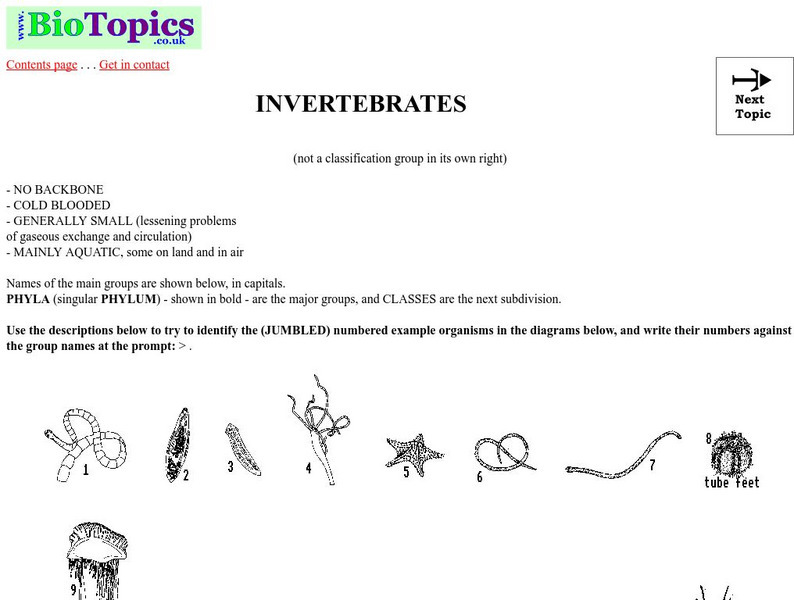Sophia Learning
Sophia: Animals: Invertebrates: Lesson 3
This lesson will explain the characteristics of animals that are classified as invertebrates. It is 3 of 4 in the series titled "Animals: Invertebrates."
Sophia Learning
Sophia: Animals: Invertebrates: Lesson 4
This lesson will explain the characteristics of animals that are classified as invertebrates. It is 4 of 4 in the series titled "Animals: Invertebrates."
What2Learn
What2 Learn: Invertebrates
Play an interactive game of hangman to prove your knowledge phyla of invertebrates.
Other
Sea Gallery: Invertebrates
Dive into a virtual gallery of invertebrates found in the sea. Discover how these creatures get around and find their next meal.
Smithsonian Institution
Smithsonian National Zoo: Meet Our Animals
This site from the National Zoological Park provides extensive information about many types of animals. Just click on the category you need. Includes pictures and live web cams.
Songs for Teaching
No Backbone Beat
Learn your invertebrates with this great rap. Your students will be walking through the halls singing this rap, when you begin your invertebrate unit with it. It covers protozoan, metazoan, arthropods, and more.
Biology 4 kids
Biology4 Kids: Invertebrates
Biology site provides information on the two basic groups of higher animals as well as a list of what makes invertebrates different.
ClassFlow
Class Flow: Vertebrates and Invertebrates
[Free Registration/Login Required] Using this lesson the students will review the 2 groups of animals - vertebrates and invertebrates. They will be actively involved in classifying animals. An Activote assessment is also included.
ClassFlow
Class Flow: Classifying Invertebrates
[Free Registration/Login Required] This is a lesson on classifying invertebrates based on their observable features. It focuses on the three types of worms: flatworm, roundworm, and segmented worm. The lesson contains 3 videos as well as...
ClassFlow
Class Flow: Invertebrates
[Free Registration/Login Required] This flipchart is about the eight most common invertebrate phyla. The flipchart includes links to websites and Activote assessment questions.
ClassFlow
Class Flow: Moving and Growing
[Free Registration/Login Required] In this unit children learn about how the skeleton is related to movement and support in humans and what happens to the skeleton and muscles as they move. They also compare human bones and skeletons...
ClassFlow
Class Flow: Habitats
[Free Registration/Login Required] Through this unit, children will begin to understand the concept of a habitat, how it provides organisms found there with conditions for life and how animals depend on plants or other animals which eat...
Ducksters
Ducksters: Animals for Kids: Invertebrates
What is an Invertebrate? Kids learn about these animals that have no backbone such as worms, mollusks, insects, and spiders.
BiologyWise
Biology Wise: Parasitic Flatworms
Describes types of flatworms that are parasitic to humans and animals and what their life cycle looks like. Two or more hosts are needed for them to complete their life cycle.
BiologyWise
Biology Wise: What Are the Different Types of Flatworms
Describes the basic characteristics of three of the major kinds of flatworms, including tapeworms, planarians, and flukes.
BiologyWise
Biology Wise: Vertebrates and Invertebrates
The characteristics of vertebrates and invertebrates are described here. Includes a list of examples for each group and a chart highlighting their differences.
Mocomi & Anibrain Digital Technologies
Mocomi: A to Z of Insects Complete List
Defines insects and provides an A to Z list of insects of our world.
PBS
Pbs: Scientific American Frontiers: Shell Game
A companion to a PBS program, this Jeopardy-style game test students as they identify the characteristics of mollusks.
The Franklin Institute
The Franklin Institute: Living Things Families
What do centipedes and crabs have in common? What's so special about a backbone? Check this site out from The Franklin Institute if you are interested in biology and classification.
Quia
Quia: Animal Classification
Use this website to test your knowledge of which animals belong to which groups.
Quia
Quia: Animal Classifications
An interactive matching game from Quia dealing with animal classifications.
Curated OER
Ar Kive: Emperor Scorpion (Pandinus Imperator)
The largest of scorpions, but not the longest, the emperor scorpion (Pandinus imperator) has a dark body ranging from dark blue/green through brown to black. The large pincers are blackish-red and have a granular texture. The front part...
Curated OER
Invertebrates
Biology site provides information on the two basic groups of higher animals as well as a list of what makes invertebrates different.
















